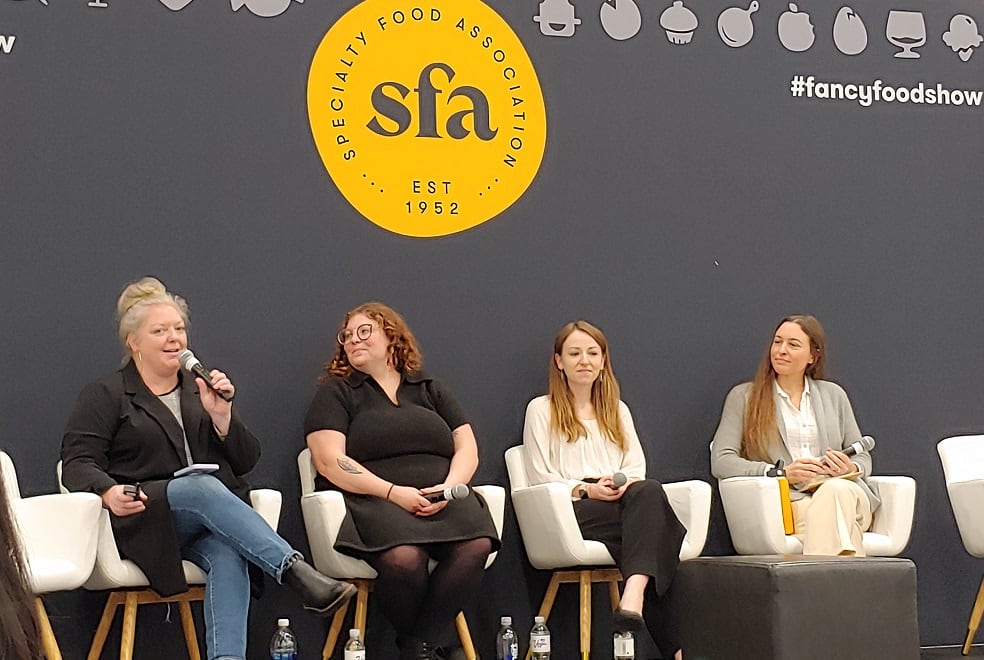Since 2005 as a nut butter brand, Justin’s expanded into confectionery in 2011 with its 100% organic, Rainforest Alliance-certified peanut butter cups, paving the way for additional SKUs like Dark Chocolate Cashew Butter Cups and Dark Chocolate Almond Butter Cups in 2018. It later verified the brand’s entire product line through the Non-GMO Project.
Andino emphasized the importance of providing premium and clean indulgence to consumers who prioritize natural and organic products.
“There’s really a strong growing desire for permissible indulgence, so over 50% of consumers consider indulgent foods an important part of their balanced lifestyle, and 30% of households with kids are purchasing cleaner versions of classic chocolate candies,” Andino explained, citing data from Hartman Group’s 2023 Great Wellness Reset report.
The dark chocolate candy pieces, in Dark Chocolate Peanut and Dark Chocolate Peanut Butter flavors, was an opportunity for Justin’s to bring “an organic option to the market,” particularly for nostalgic candy treats.
“National options have been limited but there has not been an organic option that’s nationally distributed and that is a hero mark of our confections line is being USDA-certified organic,” which contain “no synthetic ingredients, use all natural colors from fruits and vegetables, no Stevias, and really leveraging real food products,” Andino emphasized.
While food prices increased by 5.8% in 2023, with a deceleration of 1.3% in 2024, based on USDA data, consumers still will pay a premium for chocolate. According to Circana data, as reported in SF&WB, the chocolate candy category in 2022 reached $18.78bn, an increase of 9.2 percentage points from the previous year.
Consumers overall are “typically purchasing natural, organic across many categories instore,” Andino said, highlighting that the organic, indulgent category is led by consumers “making informed decisions,” and who “want to feel good about indulging … with less guilt.”
In retail, Andino emphasized Justin’s omni and brick-and-mortar strategy for its dark chocolate candy pieces, which will be available at Whole Foods Markets, Amazon, The Fresh Market and at Stop & Shop, “with more national distribution on the way.”
For this launch, Justin’s has a “fully integrated marketing launch support” with organic and paid influences, shopper marketing programs and a partnership-driven consumer giveaway, Outdoor Play to Aprés’ with other brands like Fjällräven, Klean Kanteen and Turtle Fur on social media.
Andino added that the partnered giveaways “helps us broaden our audience and also provide that education to consumers about new products and all the good things that go into making Justin’s.”
Packaging does the “heavy lifting” in communicating certification and ingredient transparency
Andino noted that labels on pack do most of the “heavy lifting for the Justin’s brand.”
The USDA-certified organic label is featured on the front, while the GMO logo will be moved to the front with an upcoming brand refresh.
“Packaging really does a lot of heavy lifting and helping consumers understand what certifications each brand offers as well as they can do the learning from there to understand the differences between the options … that is the primary vehicle for communication, as well as social media or the website,” she said.
Evolving corporate social responsibility for ingredients and packaging
Andino highlighted Justin’s ongoing efforts towards corporate social responsibility whether through ethical ingredient sourcing, partnerships with certifying bodies and improving packaging sustainability, among others.
In 2022, Justin’s reduced plastic in its nut butter jars by 30% by developing a thinner plastic material “but still keeping the total ounces of the product the same in its 16- and 20-ounce jars,” Andino said.
Last March, the company removed paper cup liners from its Super Dark SKUs, saving more than 800 pounds of paper annually.
Starting this year, the company plans to reduce plastic by 13% on the Peanut Butter Milk and Dark Mini’s stand-up pouches; while the company matches 100% of electricity used to produce all caddies with renewable energy certificates for both Squeeze Packs and 2-pack Peanut Butter Cups.
“A big piece of Justin’s is our engagement and corporate social responsibility. [We are] focusing on not just making great products that taste delicious and amazing that offer those mindfully sourced ingredients, but keeping an eye on how we can improve sustainability of our packaging,” she added.



